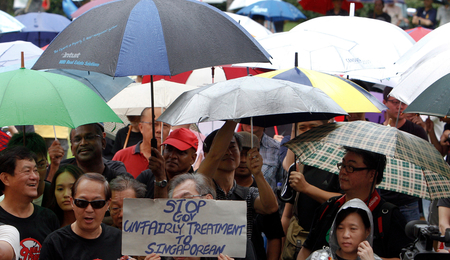Amnesty International condemns the conviction on 3 October of activist and artist Seelan Palay, who was sentenced to two weeks’ imprisonment after refusing to pay a fine of SGD 2,500 (USD 1,800), for holding a piece of art outside Parliament in 2017. The organisation considers the conviction a violation of the right to freedom of expression and calls for the quashing of the conviction and sentence.
In May 2018, the Attorney-General’s Chambers of Singapore charged Palay, an activist and artist, under Section 7 of the Public Order Act for holding a “public procession” without a permit. In October 2017, Palay was able to secure a permit to stage his one-man performance at the Speakers’ Corner in Hong Lim Park, however, police argued he held a ‘procession’ as he carried his art and held it for a short time outside Parliament House. In her decision, 17th District Court Judge Salina Ishak stated that there was no need for the prosecution to prove that public disorder had been caused, as the prosecutor had shown that the second part of his performance occurred without a permit. Amnesty International views restrictions of the rights to freedom of expression and peaceful assembly only to one specific designated area – Hong Lim Park – as a grossly disproportionate restriction on the exercise of such rights.
Currently, human rights defender Jolovan Wham is also on trial for organizing a peaceful assembly involving a foreign speaker, and for refusing to sign a police statement. Amnesty International urges Singapore authorities to immediately stop criminal proceedings against Wham, which are another attempt by the authorities to silence public debate.
Apart from the charge under Section 7 of the Public Order Act over the said assembly, Wham is also facing charges for organising two other public assemblies without the necessary permit, for refusing to sign police statements following the three incidents as required under Section 180 of the Penal Code, and for “vandalism”.
The conviction of Palay and the criminal proceedings against Wham take place in a climate where activists regularly face investigations and charges for no reason other than the peaceful expression of their views, and for organising peaceful gatherings. While international human rights law allows for some restriction on the rights to freedom of expression, association and peaceful assembly, any such restriction must be narrowly and precisely defined, and be proportionate to the intended purpose.
Amnesty International thus calls on the Singapore authorities to quash the conviction of Palay and drop all charges against Wham. The organisation is also calling for the repeal or amendment of all laws and legal provisions that unjustifiably restrict the rights to freedom of expression and peaceful assembly, including provisions in the Public Order Act, Section 142 of the Penal Code, and Section 290 of the Public Nuisance Act, to bring them into line with international human rights law and ensure in practice that the rights to freedom of expression and peaceful assembly are enjoyed by all.
Background
On 1 October 2017, Seelan performed an art piece titled ‘32 years: The Interrogation of a Mirror’. Palay obtained a permit to stage his art at Speakers’ Corner in Hong Lim Park, and then proceeded to carry his art to the front of Parliament House where he stood for a short time, before being arrested by police. Police said Palay was not given a permit to bring his art outside the designated area, and he was charged under Section 7 of the Public Order Act.
In 2016, Jolovan Wham organised a seminar on civil disobedience and democracy that featured an address by Hong Kong democracy activist Joshua Wong via a video link. According to the Singapore Police Force, they approached Wham prior to the event and told him that the activity required a permit as it involved a foreigner commenting on ‘political issues’. As Wham proceeded to carry out the event without a permit, police charged Wham under Section 7 of the Public Order Act. Following the incident, Wham refused to sign cautioned statements as required under Section 180 of the Penal Code, after the police refused to provide him copies of the statements.
The Public Order Act, promulgated in 2009 regulates public talks, religious assemblies, political protests and other gatherings. In April 2017, amendments to the Act were adopted by Parliament, giving police and other officials broad and arbitrary powers to further limit or ban public assemblies and protests. The amendments require organizers of public events to apply for permits at least 28 days in advance; those who fail to do so may be fined up to SGD$ 20,000 (USD$ 14,297), imprisoned for up to a year, or both.
 People shelter under umbrellas at a demonstration against a government white paper on population at Speakers' Corner in Singapore February 16, 2013. The paper released in January said the island's population of 5.3 million could grow by as much as 30 percent by 2030, mostly through foreign workers to offset a chronically low birth rate. REUTERS/Edgar Su (SINGAPORE - Tags: POLITICS CIVIL UNREST)
People shelter under umbrellas at a demonstration against a government white paper on population at Speakers' Corner in Singapore February 16, 2013. The paper released in January said the island's population of 5.3 million could grow by as much as 30 percent by 2030, mostly through foreign workers to offset a chronically low birth rate. REUTERS/Edgar Su (SINGAPORE - Tags: POLITICS CIVIL UNREST)












